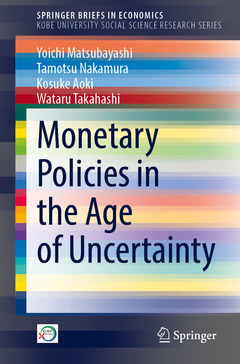Monetary Policies in the Age of Uncertainty, 1st ed. 2021 Kobe University Social Science Research Series
Auteurs : Matsubayashi Yoichi, Nakamura Tamotsu, Aoki Kosuke, Takahashi Wataru

This book provides an interesting review of Japanese monetary policies after the bubble economy. The Bank of Japan was the first central bank in advanced economies to implement the unconventional monetary policies during the period. After the Lehman shock, most advanced economies also carried out similar monetary policies to boost their own economies. The Japanese experience in the 1990s and 2000s no doubt played a key role during the period. Although various aspects of the experiences have been examined, not many books have been published based on intensive discussions between the macro and monetary theorists who have been active in academics and the practitioners who have actually been involved in monetary policy. This small but important book has focused on the Japanese experience. Evaluation of that experience found that three solid pillars are of crucial importance: theory, institution, and experience. Those form the basis of the book, without theory, no policies will be formulated and implemented, and implementation depends crucially on institution. Chapter 1 provides a clear theoretical background for the unconventional monetary policies and inflation targeting. Chapter 2 intensively explores the meaning and desirability of the independence of central banks. Chapter 3 reviews the consequences of the Japanese monetary policies in recent decades in comparison with those in other advanced economies.
Yoichi Matsubayashi has been the dean of the Graduate School of Economics at Kobe University since 2020 and a professor there since 2003. He is also a senior fellow at the Japanese Ministry of Finance's Policy Research Institute and a visiting fellow at the Bank of Japan's Institute for Monetary and Economic Studies.
Tamotsu Nakamura is a professor of economics at Kobe University in Japan and an adjunct professor of economics at Xiamen University in China. He was also a visiting professor of economics at the University of British Columbia in Canada.
Kosuke Aoki is a professor of economics at the University of Tokyo. He received the Japanese Economic Association (JEA) Nakahara Prize, which was established in 1995 to honor researchers in economics under the age of 45 who have made significant contributions that are internationally recognized.
Wataru Takahashi is a professor of economics at the Osaka University of Economics. He worked at the Bank of Japan for35 years, including as an advisor on international affairs to the governor from 2002 through 2006, responsible for financial cooperation between central banks in East Asia and economic research on the global economy. He was also the director-general of the Bank of Japan Academic think tank, the Institute for Monetary and Economic Studies from 2006 through 2011.
Date de parution : 08-2021
Ouvrage de 61 p.
15.5x23.5 cm
Thèmes de Monetary Policies in the Age of Uncertainty :
Mots-clés :
Unconventional Monetary Policy; Bank loan supply; Inflation target; Inflation expectation; Forward looking monetary policies; In general roles of expectation in structural policies; Central bank independence; Fiscal dominance; Financial stability; History of central banks; Yield Curve Control



